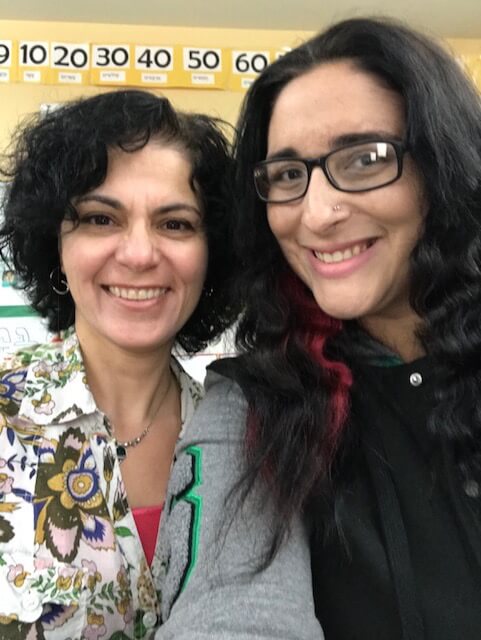At Oakland Hebrew Day School, the middle school Hebrew and Humanities teachers co-planned and co-taught a unit that combined constructing evidence-based arguments using current events, and crafting arguments, counterarguments, and rebuttals in Hebrew in preparation for a debate.
Entry Narrative
Debating the Issues – In Hebrew! Is a three week unit created specifically for the mixed grade (6-8) Shokolad Hebrew class. This course is geared for students who have demonstrated the highest speaking, writing, and reading skills in Hebrew. However, this unit can be modified to accommodate students with a more limited Hebrew skills.
Stage one of the unit begins in middle school Humanities classes. Through the year students engage and explore issues in current events. focusing in particular on divisive political issues such as immigration and media bias. For this particular unit, the Humanities and Hebrew teachers decided to use gun control as the topic for the debate. Using leveled articles from NewsELA, students read, annotated, and discussed the issue in depth. For this part of the unit, students were encouraged to express their personal opinions on the issue, using evidence to support their thinking. This stage is taught exclusively by the Humanities teacher.
In stage two, the unit moves into the Shokolad class, building vocabulary in preparation for their debate. Debate, argument, counterargument, and rebuttal are taught, as well content-specific terms such as amendment, restriction, assault weapons, and self defense. More terms are added to students’ word bank as debate preparation progresses. This stage is taught exclusively by the Hebrew teacher.
The third stage synthesizes the work done in stages one and two. Students are put into teams: a pro-gun control laws and an anti-gun control laws. In order to bolster their arguments, students are given additional information supporting their cause (in English). In teams, students read through the information and rank the strongest arguments. Next, the teams brainstorm possible counterarguments to their stance and craft evidence-based rebuttals. This work is done in the mixed-grade Hebrew class, facilitated by both teachers. At this point, one student from each team is selected to be a debate moderator. Students have the option to say on their team as a debater, or to assume the role of moderator and work on crafting questions about the issue in Hebrew. Choosing a representative from each team ensures that the questions will be based on the information given to the teams. Finally, students work together to craft formal, written arguments in Hebrew, incorporating the vocabulary acquired throughout the unit. They must also prepare for potential counterarguments from the opposing team by writing rebuttals in Hebrew. Additionally, one member of each team is picked to give an opening statement, outlining the team’s overall stance on the issue. This work is also done during Hebrew class, with the Hebrew teacher providing vocabulary and sentence structure support, and the Humanities teacher providing content support.
The final stage is the debate, which takes place in the Hebrew class.
Outline of the Debate
- Moderators present the purpose and format for the debate
- Each team gets 2 minutes to prepare an opening statement
- Moderators ask a question
- Team A or B responds (2 min max)
- Opposing team gets a chance to present a counter argument (1 min max)
- First team gets a chance to present a rebuttal (2 min max)
- Step 3 repeats, with each team getting equal opportunity to address the question first
Videos and Pictures
https://drive.google.com/drive/u/0/folders/0B2GBczhmMemWdHJKZFBBTTloaE0
After the debate, students and teachers reflect on the process and product (debate), highlighting what went well and what could be improved upon next time. In the final reflection, students suggested that the debate be held for an audience, such as other Hebrew classes or middle school classes. We look forward to the opportunity of incorporating student feedback into our next interdisciplinary debate unit.
Entrant Bio(s)
Joanne Davi - 5,8 Humanities Teacher, 3-8 Humanities Coordinator
Ms. Davi taught special education and humanities for five years at the Lighthouse Community Charter School before joining Oakland Hebrew Day School in 2014. She holds a B.A. in History, and a minor in Religious Studies from San Francisco State University, and a multiple subject teaching credential and master’s in teaching from the Reach Institute for School Leadership. She is passionate about developing integrated classes and interdisciplinary units, pushing for the creation of Humanities curriculum over separate English and History courses. When she’s not working, she spends as much time as she can with her husband and young son, and plans trips to Disneyland.
Efrat Simhi-Aloni - 5-8 Hebrew Teacher, K-8 Hebrew Coordinator
G’veret Aloni has taught at Oakland Hebrew Day School since 2002. Before that, she spent 10 years teaching high school and adult education. She also served as an army youth instructor in Israel, preparing students for their mandatory army service. G’veret Aloni has her M.A. in educational administrative policy from Ben Gurion University, and her B.A. in Hebrew language and literature. She loves to dance, paint, and hike with her family in her off hours.

This entry has been tagged with the following terms: